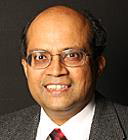
|
Dr. B.L. Ramakrishna received his PhD from the Indian Institute of Technology, Madras in 1982 and joined the faculty at Arizona State University in 1985 after postdoctoral work at University of Zurich and Washington State University. The research questions that he investigated lie at the crossroads of Biology and Engineering. He studied biological supramolecular assemblies such as proteins, membranes, and DNA that are capable of incorporating inorganic solids and precisely engineer their size, shape, and orientation at the nanometer scale. The applications of the research on biosensor design and silicon-bio hybrid devices span a wide spectrum from mining, electronics, and health to defense. From 2001 to 2011 he directed the NSF-sponsored GK-12 project, whose goal was to integrate seamlessly the educational efforts at the university and secondary school levels for strengthening the pipeline to recruit highly motivated and well prepared students into STEM careers. He is dedicated to preparing engineers that not only have the necessary engineering skills but also the cross-disciplinary knowledge, entrepreneurial spirit, global perspective and a sense of mission needed to lead our country and the world to meet the great challenges facing humankind in the 21st century. From 2009-2013, he was the director of Arizona State University’s Grand Challenge Scholars program. From 2011-2016, he was the Diane and Gary Tooker Professor of Materials Science and Engineering and he retired from ASU in 2016. In January 2017, he accepted a position at the National Academies as the Director of the Grand Challenge Scholar Program Network. His main responsibilities are to broaden and deepen the impact of the National Academy of Engineering’s program across the US and around the world by forging vibrant partnerships between universities, engineering societies, industry, civil society and governments.
USAID Profile
Office of Sustainable Development
Bureau For Africa B.L. Ramakrishna served as a senior science and technology advisor in AFR/SD. The office provides intellectual, technical and strategic leadership on policies and priorities in the areas of health, education, infrastructure, energy, economic growth and governance. The specific responsibilities included, a) working with the team to design and guide the implementation of "Power Africa" - the recently announced Presidential initiative http://www.usaid.gov/powerafrica b) assisting in the development of strategies, programs and relationships that support USAID's objectives in the energy sector (including especially renewable, mini grid and off grid solutions) as it relates to African agriculture, environment and economic growth and c) developing an academic engagement strategy for Power Africa through partnerships with universities in the US and across Africa that would lead to an enduring electrification of sub-Saharan Africa.
|




